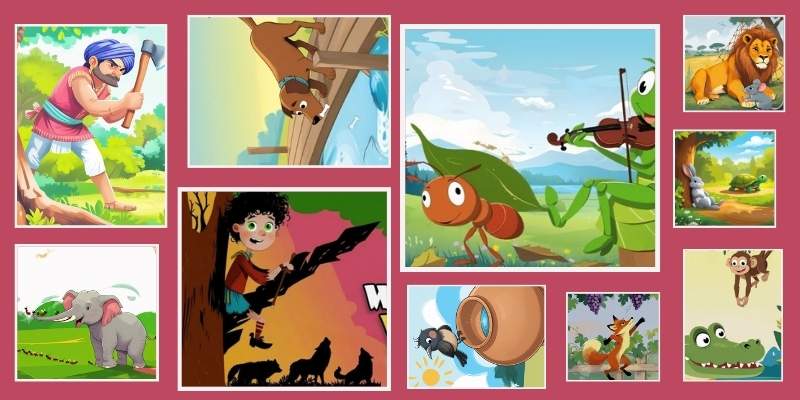Short Stories for Kids With Moral: Short stories are a great way to teach children important life lessons in a fun and simple way. These timeless tales have been passed down for generations, helping kids understand values like honesty, kindness, patience, and hard work.
In this collection, you’ll find classic short stories with powerful moral lessons. From the clever tricks of a monkey to the patience of a slow-moving tortoise, each story carries a message that children can learn from and remember.
#1 The Little Bell That Rang at Midnight
#2 The Secret in the Treehouse
#3 Short Stories for Students Motivation
#4 She Closed Her Eyes for One Second, And Woke Up in Yesterday
#5 Story Hansel and Gretel Story
#6 Klaas and the Cheese Dream
#7 The Sorcerers’ Apprentice Story | Moral Story
#8 The Emperor’s New Clothes Story
#9 How the Bear Lost His Tail
#10 The Magic Chariot, the Sword, and the Seer
#11 The Love Story of Vijay and Padmavati
#12 The King Roopsen Who Gave His Life for His Loyal Servant
#13 The Arjun’s Courage and the Goddess’s Blessing
#14 The King and the Three Perfectionists
#15 The Sensitive Queens of Ujjayani
#16 The Four Brothers and the Lion
#17 The Battle for Princess Marriage
#18 The Magic Spell & Meera
#19 It’s Impossible to Love Deeply Without Sacrifice
#20 Love Beyond Mountains Story
The Hare and the Tortoise
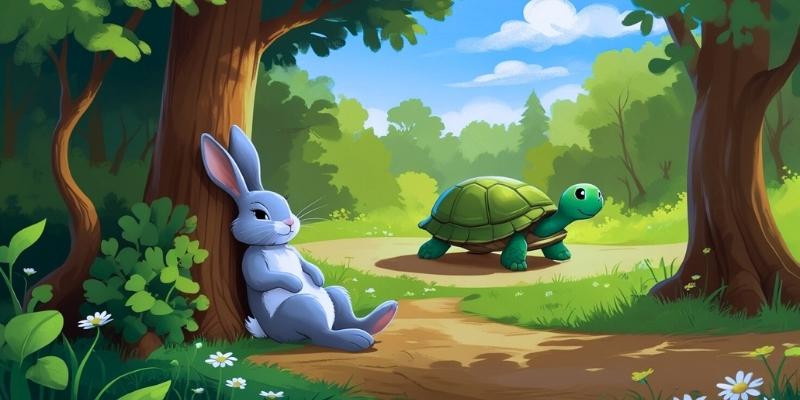
One bright morning in the forest, a proud hare hopped around, boasting to all the animals. “I am the fastest runner in this whole jungle! No one can beat me in a race!” he said, laughing.
The animals sighed. They had heard this before. But then, a small voice spoke up. “I will race you,” said the tortoise.
The hare burst into laughter. “You? You can barely move! This will be too easy!”
But the tortoise only smiled and said, “Let’s find out.”
The fox, who was respected by all, agreed to be the judge. He marked the starting line and pointed to a big tree on the other side of the hill. “The first to reach the tree wins!”
“On your marks… Get set… Go!”
The hare dashed off like the wind, leaving a cloud of dust behind. The tortoise, slow and steady, took his first step. The hare glanced back and smiled. “This race is a joke!” he thought.
A little further ahead, he stopped and looked at the tortoise, who was still far behind. “That slowpoke will take forever! I have time for a nap.”
The hare curled up under a shady tree and dozed off, snoring loudly. Meanwhile, the tortoise kept moving. Step by step, he made his way past the trees, across the hill, and closer to the big tree.
The sun moved across the sky, and a gentle breeze blew through the forest. The other animals gathered near the finish line, whispering in excitement. “Look! The tortoise is almost there!”
Just then, the hare woke up with a jolt. He stretched, yawned, and looked around. “Oh no!” The tortoise was only a few steps away from the finish line!
Panicking, the hare jumped up and sprinted as fast as he could. His paws barely touched the ground. But it was too late. The tortoise took his final step and touched the tree.
The animals cheered loudly! The tortoise had won!
The hare hung his head in shame. “I was too sure of myself and too lazy,” he admitted. “I should have kept going instead of taking a nap.”
The tortoise smiled. “Fast or slow, the important thing is to keep moving.”
Moral of the Story ♡♡˚
Slow and steady wins the race. Overconfidence and laziness can lead to failure, but patience and perseverance bring success.
The Honest Woodcutter
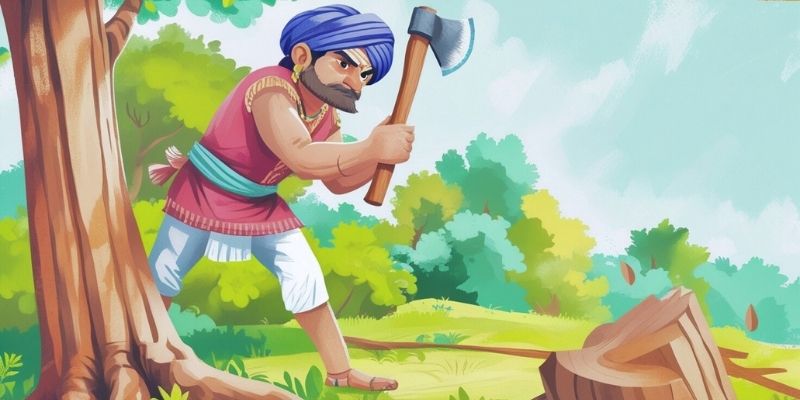
In a village near the forest, there lived a poor woodcutter named Ramu. He worked hard every day, cutting wood and selling it in the market to earn his living. Though he had little, he was honest and never took anything that did not belong to him.
One afternoon, while chopping wood near a river, his axe slipped from his hands and fell into the deep water. Ramu gasped. That was his only axe! Without it, he couldn’t work or feed his family. He sat by the river, feeling helpless.
Just then, the water shimmered, and a kind-looking goddess rose from the river. She held a shiny golden axe in her hand. “Is this your axe?” she asked gently.
Ramu shook his head. “No, that is not mine. My axe was old and made of iron.”
The goddess smiled and disappeared beneath the water. A moment later, she returned, holding a silver axe. “Is this the one?” she asked.
Again, Ramu shook his head. “No, mine was not made of silver. It was just a simple iron axe.”
The goddess nodded and dipped into the river once more. This time, she brought back an old, worn-out iron axe. “Is this yours?”
Ramu’s face lit up. “Yes! That is my axe!” he said happily.
The goddess was pleased with his honesty. “You could have taken the gold or silver axe, but you spoke the truth. As a reward, you may keep all three axes.”
Ramu was overjoyed. He thanked the goddess and returned home with his iron axe, the silver axe, and the golden axe. When he told his fellow villagers about what had happened, they were amazed by his honesty.
Moral of the Story ♡♡˚
Honesty is always rewarded. No matter how tempting it is to be dishonest, truthfulness brings greater blessings in the end.
The Fox and the Grapes
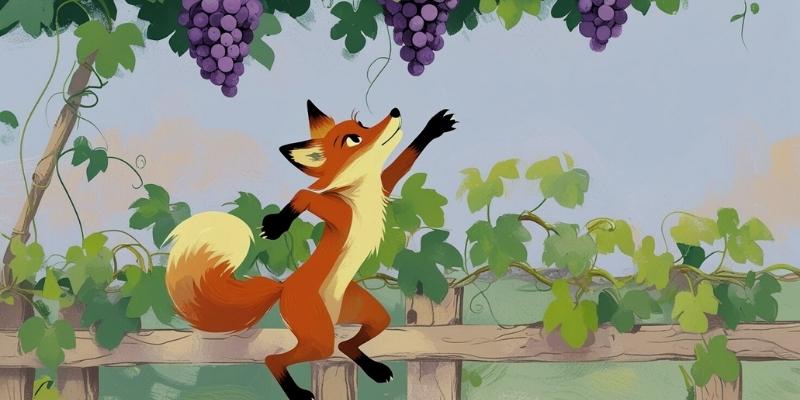
On a hot summer afternoon, a hungry fox wandered through the forest, searching for food. His stomach growled as he sniffed the air, hoping to find something delicious.
As he walked, he spotted a grapevine hanging from a tree. The vine was full of plump, juicy grapes that glistened in the sunlight. The fox licked his lips. “Those grapes look so sweet! I must have them,” he thought.
He stood on his hind legs and stretched as high as he could, but the grapes were just out of reach. Determined, he took a few steps back and leaped into the air. His paws swiped at nothing but air.
The fox huffed and tried again. He jumped higher, but still, the grapes were too far. He panted, feeling tired, but he refused to give up.
After several more tries, the fox sat down, exhausted. His legs ached, and his stomach was still empty. He glared at the grapes and muttered, “Hmph! Those grapes are probably sour anyway. Not worth my effort!”
With that, he turned his nose up and trotted away, pretending he never wanted them in the first place.
Moral of the Story ♡♡˚
It’s easy to dislike what you can’t have. Instead of making excuses, work harder to achieve your goals.
The Boy Who Cried Wolf
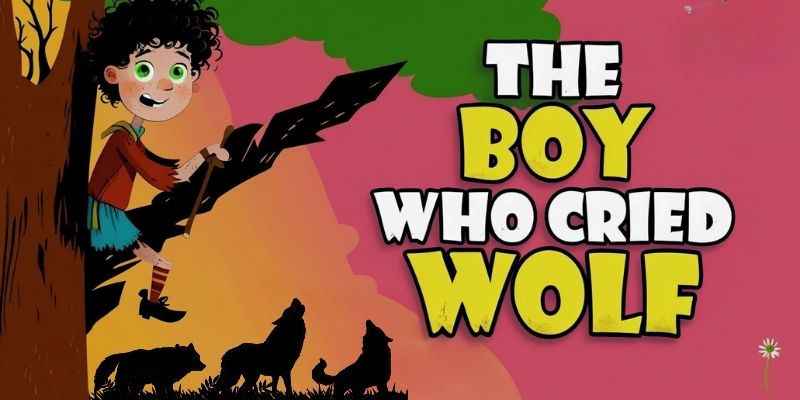
In a village, a young shepherd boy named Ravi was given the responsibility of watching over the sheep. Every day, he would take them to a green hillside, letting them graze while he sat under a tree, bored and lonely.
One afternoon, an idea popped into his head. “What if I play a trick on the villagers?” he thought with a mischievous grin.
Taking a deep breath, he ran toward the village, shouting, “Wolf! Wolf! A wolf is attacking the sheep!”
The villagers dropped everything and rushed up the hill with sticks and tools, ready to chase the wolf away. But when they arrived, there was no wolf—just Ravi, laughing.
“You should have seen your faces!” he giggled. The villagers were annoyed but shook their heads and returned to their work.
A few days later, Ravi felt bored again. He smirked and shouted, “Wolf! Wolf! Please help!”
Once more, the villagers ran to the hill, only to find Ravi laughing even harder. “I fooled you again!” he said.
This time, the villagers were angry. “Lying is not a game, Ravi,” an old man warned. “One day, you’ll regret this.”
But Ravi didn’t listen.
Then, one evening, as the sun dipped below the hills, Ravi heard a low growl. Turning around, his heart pounded—a real wolf stood among the sheep!
Terrified, he ran toward the village, shouting as loudly as he could, “Wolf! Wolf! Help! It’s real this time!”
But no one came. The villagers had heard his lies too many times. They thought he was joking again.
Ravi ran back, but it was too late. The wolf had scattered the sheep and disappeared into the forest. Tears filled his eyes as he realized his mistake. His foolish lies had cost him dearly.
Moral of the Story ♡♡˚
Liars are not believed, even when they tell the truth. Trust is fragile—once broken, it is difficult to earn back.
The Thirsty Crow
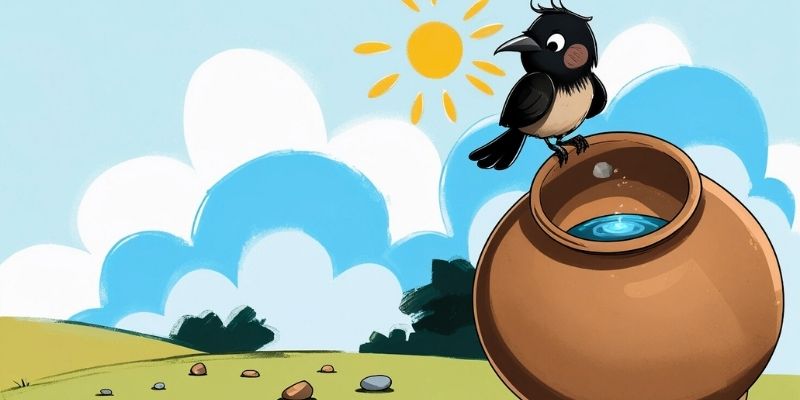
On a scorching summer afternoon, a crow flew across the land, searching for water. The rivers had dried up, and the ponds were nothing but cracked earth. His throat was dry, and his wings felt heavy.
After hours of searching, he finally spotted a tall clay pot under a tree. He swooped down eagerly and peeked inside. There was water at the bottom! But no matter how hard he tried, his beak couldn’t reach it.
The crow paced around the pot, thinking. He tried pushing it over, but it was too heavy. He flapped his wings in frustration. “There must be a way!” he thought.
Just then, he noticed some small pebbles lying nearby. An idea sparked in his mind. He picked up a pebble in his beak and dropped it into the pot. Then another. And another.
With each pebble, the water slowly rose higher. The crow kept going, determined to quench his thirst. Finally, after many pebbles, the water reached the top.
The crow eagerly dipped his beak and drank to his heart’s content. Feeling refreshed, he cawed happily and flew away, knowing that patience and intelligence had saved the day.
Moral of the Story ♡♡˚
Where there is a will, there is a way. Clever thinking and perseverance can solve even the toughest problems.
The Elephant and the Ants

In a dense jungle, there lived a mighty elephant named Gajraj. He was the biggest and strongest animal in the forest, but he was also very proud. He often bullied the smaller animals, stomping around without a care and scaring them for fun.
One day, while walking near an anthill, Gajraj saw tiny ants carrying food to their home. He laughed loudly. “You tiny creatures are so weak! I can crush you all with just one foot!” he boasted.
The ants heard his words and felt angry. One brave ant called out, “Strength is not everything. Even the smallest can teach a lesson to the biggest!”
Gajraj laughed even harder. “You? Teach me a lesson? That’s the funniest thing I’ve ever heard!”
The ants decided to show him. As Gajraj took another step, a group of ants quickly crawled up his legs and into his ears. They began biting him!
The mighty elephant trumpeted in pain. He shook his head and stomped his feet, but the ants didn’t stop. “Ahh! Stop! It hurts!” he cried, trying to get them out.
Finally, he pleaded, “Please, I’m sorry! I will never trouble small creatures again!”
Hearing this, the ants stopped and climbed down. Gajraj sighed in relief. He looked at the tiny ants with new respect. “I was wrong to think only size matters. Even the smallest can be powerful in their own way.”
From that day on, Gajraj was kind to all animals, big and small.
Moral of the Story ♡♡˚
No one is too small to be strong. Never underestimate others based on their size or appearance.
The Ant and the Grasshopper
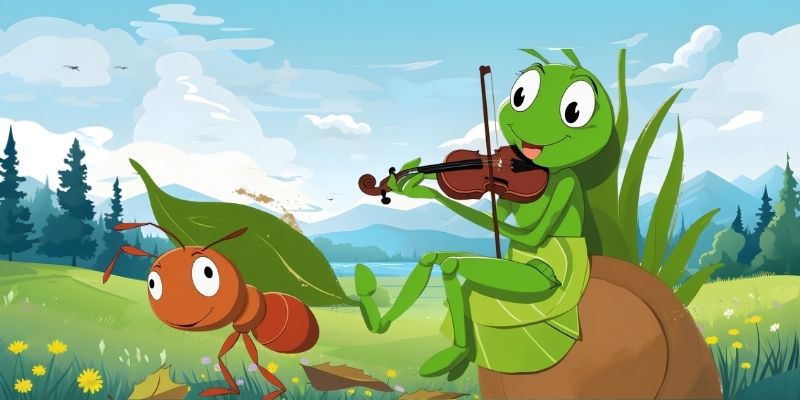
On a warm summer day, a busy little ant scurried across the field, carrying a grain of wheat toward his home. He worked tirelessly, gathering food to store for the cold winter ahead.
Nearby, a cheerful grasshopper sat on a rock, lazily strumming his fiddle. “Why do you work so hard, little ant?” he asked. “Come and sing with me! There’s plenty of food now!”
The ant stopped for a moment and looked at him. “Summer won’t last forever. When winter comes, there will be no food. I must prepare while I can,” he said and continued his work.
The grasshopper laughed. “Winter is far away! Enjoy today!” He danced and played his fiddle while the ants marched back and forth, storing food.
Days passed, and then weeks. Soon, the warm days disappeared, and winter arrived. Snow covered the ground, and the trees stood bare.
The grasshopper, now cold and hungry, wandered through the empty fields. There was no food left to eat. Shivering, he knocked on the ant’s door.
“Dear ant, I have nothing to eat! Please share some food with me!” the grasshopper pleaded.
The ant looked at him kindly but said, “During summer, we worked hard while you played. We stored food while you sang. Now, we have enough to last through the winter.”
The grasshopper hung his head, realizing his mistake. He had wasted his time instead of preparing for the future.
From that day on, he promised himself that when summer returned, he would work as hard as the ants.
Moral of the Story ♡♡˚
Hard work and planning for the future lead to success, while laziness brings regret.
The Lion and the Mouse

One afternoon, deep in the jungle, a mighty lion lay under a shady tree, resting after a big meal. As he dozed off, a tiny mouse scurried through the grass, looking for food.
By accident, the mouse ran across the lion’s huge paw. The lion’s eyes flew open, and with a swift movement, he trapped the mouse under his claws.
“How dare you wake me up?” the lion growled. “I should crush you right now!”
The little mouse trembled but gathered his courage. “Oh great King of the Jungle, please let me go! I didn’t mean to disturb you. One day, I might be able to help you!”
The lion let out a loud laugh. “You? Help me? That’s the funniest thing I’ve heard!”
Still, he was in a good mood, so he lifted his paw and let the mouse go. “Run along, little one. You’re too small to matter.”
Days passed, and one evening, the lion was roaming the jungle when he walked into a hunter’s trap. A thick net fell over him, tangling his powerful legs. He roared and struggled, but the more he moved, the tighter the net became.
Hearing the lion’s loud cries, the little mouse rushed to the scene. “Hold still, Your Majesty! I will help you,” he squeaked.
With his tiny sharp teeth, the mouse began gnawing at the thick ropes. Bit by bit, he chewed through them until—snap!—the net broke apart.
The lion shook himself free and stood up, amazed. “Little mouse, I was wrong to laugh at you,” he said kindly. “You saved my life! Thank you.”
The mouse smiled. “Even the smallest can help the strongest.”
From that day on, the lion and the mouse became the best of friends.
Moral of the Story ♡♡˚
Kindness is never wasted. Even the smallest can help in great ways.
The Greedy Dog

One afternoon, a hungry dog wandered through the village, searching for food. After sniffing around, he found a juicy bone outside a butcher’s shop. His tail wagged with excitement as he grabbed it and ran off to enjoy his meal in peace.
He trotted toward the river, thinking, This is the best bone ever! No one else will have it but me!
As he reached the riverbank, he stepped onto a small wooden bridge. Just as he was about to cross, he glanced down and saw his reflection in the water.
But the silly dog thought it was another dog holding a bigger, juicier bone!
His eyes widened with greed. That bone looks even better than mine! I must have it!
Without thinking, he barked loudly, hoping to scare the other dog away. But as soon as he opened his mouth—plop!—his own bone slipped from his jaws and fell into the river.
He gasped and watched helplessly as the bone sank beneath the water, disappearing forever. His stomach growled, and he realized his foolishness.
With his head hanging low, the greedy dog walked away, learning an important lesson—his greed had cost him everything.
Moral of the Story ♡♡˚
Greed can lead to loss. Be content with what you have.
The Clever Monkey
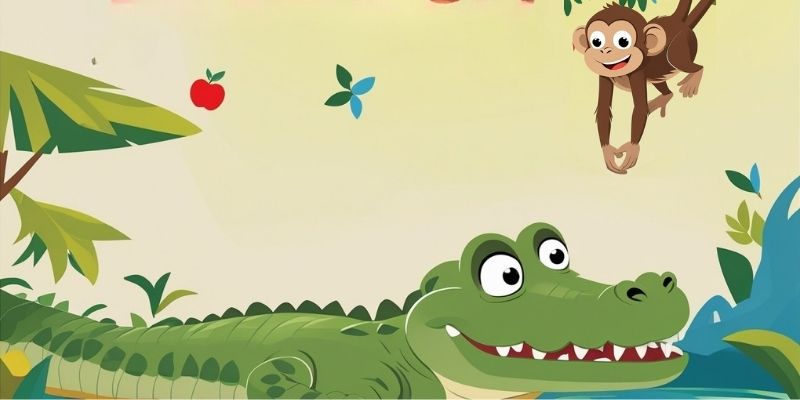
Deep in the jungle, a clever little monkey lived on a tall mango tree near a river. He was quick, playful, and loved to eat the sweet, juicy mangoes that grew on his tree.
One day, a crocodile swam up to the riverbank. He looked tired and hungry. The monkey, feeling kind, plucked a ripe mango and tossed it down. “Here, try this! It’s sweet and delicious,” he said.
The crocodile munched on the mango and smiled. “This is the best thing I’ve ever tasted!” From that day on, the monkey and the crocodile became friends.
But the crocodile had a problem—his wife. When he told her about the tasty mangoes, she sneered, “If the monkey eats such sweet fruit every day, imagine how sweet his heart must be! Bring me his heart!”
The crocodile was shocked, but he didn’t dare say no to his wife. The next day, he swam to the monkey and said, “My friend, my wife would love to meet you! Come with me to my home across the river.”
The monkey hesitated. “But I can’t swim!”
“Don’t worry, climb onto my back,” the crocodile assured him.
The monkey trusted his friend and hopped onto his back. But as they reached the middle of the river, the crocodile grinned wickedly. “I must tell you the truth, dear friend. My wife wants to eat your heart, and I have to take it to her!”
The monkey’s eyes widened, but he stayed calm. “Oh! Why didn’t you tell me earlier?” he said cleverly. “I don’t carry my heart with me. I left it on the tree! Take me back, and I’ll give it to you.”
The foolish crocodile believed him and turned around. As soon as they reached the tree, the monkey leaped off and climbed to the highest branch. He laughed and said, “You tricked me once, but you won’t trick me again! Go home, greedy crocodile!”
The crocodile realized his mistake and swam away, ashamed.
Moral of the Story ♡♡˚
Quick thinking can save you from trouble. Stay calm and use your intelligence in difficult situations.

